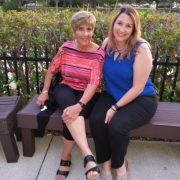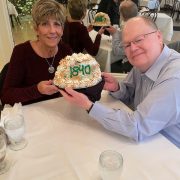A Decade Ago, Doctors Gave Donna Robinson 3 Months to Live
Donna Robinson
Contributing Writer
Julia Brabant
June, 2024
Date of Diagnosis: July 2014
A Decade Ago, Doctors Gave Donna Robinson 3 Months to Live
In the summer of 2014, Coral Springs, Florida’s Donna Robinson received a sobering diagnosis: Stage 4 pancreatic cancer. Her doctors deemed her inoperable, estimating she had about three months left to live. A decade later, she’s sharing her own story, noting that while there are plenty of pancreatic cancer success stories out there, too many remain untold.
Donna had virtually no symptoms until she took a trip to Austria and Germany and developed what she thought was a bladder infection. She began taking medication for it and mentioned it to one of her sisters, who worked for the University of Miami health system. Her sister encouraged Donna to have a colonoscopy as an additional precaution, and Donna agreed, having never had one before.
The colonoscopy revealed what doctors referred to as a “tiny tumor,” but they recommended she have an endoscopy, a procedure that would provide a more detailed examination, to be sure. Upon closer examination, Donna’s medical team changed its tune, with one doctor saying she had the biggest tumor he’d ever seen on a pancreas and delivering the estimated three-month prognosis.
“When he said that, what first came into my head was, it’s not the cancer that’s going to kill you,” she said. “It’s the fear of cancer that’ll get you.”
She told the doctor that, despite the poor prognosis, she envisioned herself one day having surgery and then going on to live a happy, normal life.
“I told myself, ‘You create your own reality,’” Donna said. “I had two kids in high school, and I wasn’t ready to go.”
Donna’s care team decided to start her on chemotherapy with FOLFIRINOX. Donna’s initial preference was to take a more holistic approach to treatment. But with encouragement from her family, she decided to explore both avenues, undergoing 10 rounds of chemo alongside reiki and other complementary holistic methods.
Donna also made a point to remove virtually all forms of stress from her life during that time, going so far as to stop watching the news entirely. “Only Hallmark movies,” she joked.
After the first five rounds of chemo, doctors hoped to see about 5% shrinkage in Donna’s tumor. Yet, scans revealed it had shrunk by 35%, defying expectations and raising hopes about Donna’s potential for recovery. After completing treatment, Donna’s tumor had shrunk by 70%, but her doctors still considered her Stage 4/inoperable.
Donna’s husband, John, then a longtime prostate cancer survivor, himself, began conducting research about her condition and who else they might be able to see about it. He found three doctors in the United States who might be able to perform surgery on Donna.
However, none of them were local, creating logistical challenges. Somewhat serendipitously, though, one of those three doctors wound up moving to Miami during that time, and Donna ended up being the first patient he saw there.
The doctor determined he could indeed operate on Donna and performed a partial Whipple procedure, removing the tail of Donna’s pancreas as well as her spleen and about two-thirds of her stomach. Afterward, she developed diabetes, as the surgery affected her body’s ability to regulate its own blood sugar levels. She began taking Metformin to help manage it.
Adjusting to Life, Post-Surgery
Donna’s scans remained clear for several years after surgery before revealing signs of trouble, prompting her to have a full Whipple procedure in 2017. That rendered her a Type 1 diabetic, which she has been able to deal with by administering Insulin easily on a daily basis. Since then, she’s has also had to take CREON, a pancreatic enzyme replacement therapy, and omeprazole, a medication that helps ease acid in the stomach.
While she’s had to make some dietary and other adjustments in the years since, Donna feels lucky to live a relatively normal lifestyle. She bikes, swims and plays pickleball five or six times a week, making a point to stay active and embrace her “new normal.”
Donna also recognizes the role her support system, which included her husband, six sisters and many others, played in her success so far. Her husband, who passed away last year from prostate cancer, was especially instrumental in getting her the answers she needed along the way.
“I wasn’t one to look anything up,” Donna said. “My journey is different than anyone else’s, and I didn’t want preconceived ideas in my head.”
She said that, at the time of her diagnosis, people with similar conditions only had about a 5% chance of surviving the next five years. She didn’t know that at the time, though, and she thinks that was for the best.
Lending Support to Others
In the years since her diagnosis and treatment, Donna has become more ingrained in the pancreatic cancer community, serving on the Ethics and Patient Advisory committees at the hospital where she had treatment. She’s also become a resource and sounding board for the newly diagnosed, offering guidance and support not as a medical professional, but as someone who’s been there.
“Sometimes, just talking to someone who’s been alive with this for 10 years is a big plus,” Donna said. She noted that many of the people she speaks with are facing similar hurdles, like learning to take CREON and otherwise adjust to life as a diabetic.
“With the pumps and technology they have today, it pretty much takes care of itself,” she said, of her own journey with diabetes. “It’s much easier than it used to be.”
She also makes a point to raise awareness about symptoms of pancreatic cancer while acknowledging that they often don’t manifest until the cancer has reached a more advanced stage. She notes that dumping syndrome, or a condition that occurs when undigested food moves too quickly through the digestive system, can be a possible indicator of pancreatic cancer. Other possible signs, like fatigue, are very common, leading people to assume they’re likely the result of a less-serious condition.
Donna also encourages people with pancreatic cancer to de-stress their living environments, maintain positive mindsets and avoid putting too much stock in statistics.







